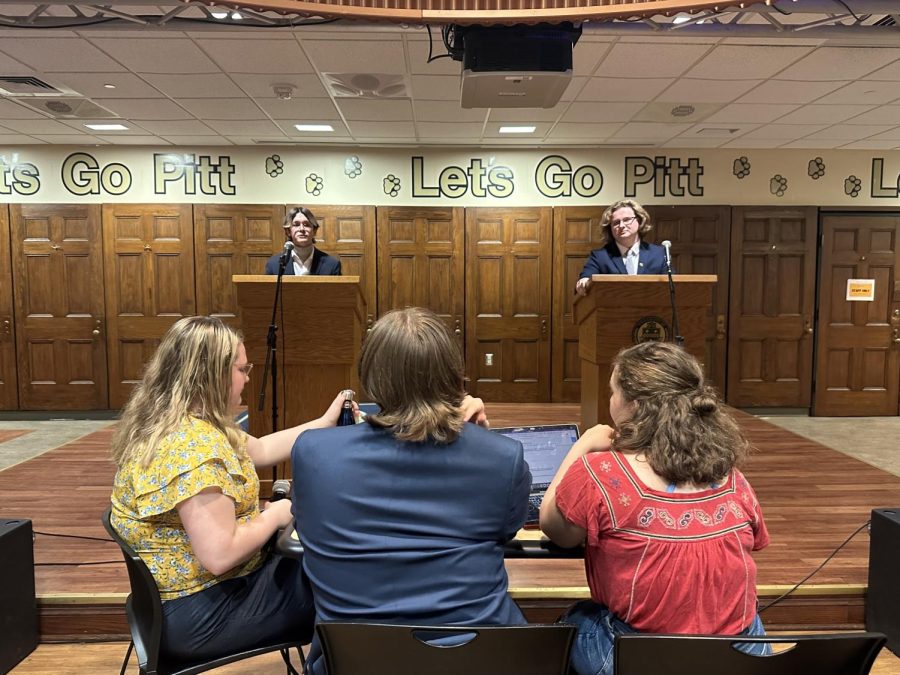Candidates for Student Government Board president discuss student representation, sexual misconduct on campus in public debate
Alexandra Ross, Contributing Editor
The Student Government Board Presidential Debate on Thursday in the William Pitt Union.
February 24, 2023
Candidates for Student Government Board president Ryan Young and Corbin Makar presented the key initiatives of their campaigns at the first public debate of the election cycle on Thursday evening.
Makar, an independent candidate who currently serves as a board member, and Young, who is running on the Illuminate slate and is the current vice president for governance, were asked questions by a panel in Nordy’s Place in front of a crowd of around 40 people.
In a debate with little back and forth, both candidates agreed that ending discrimination and sexual misconduct on campus are integral to their platforms, though they differed on how they would use the presidency to engage the student body.
In opening remarks, Young, a junior math, physics and astronomy major, said his campaign is centered on reviewing the structure of SGB to be more inclusive and connecting the student body with Pitt’s administration. Additionally, he said he would cement SGB’s current initiative to end sexual misconduct as a permanent committee.
Makar, a junior communication and rhetoric and political science double major, said if elected he would focus his presidency on raising the student worker minimum wage to $15/hour and establishing an LGBTQ+ resource center to advocate more for LGBTQ+ transparency and awareness on campus.
Posed with addressing overpopulation at Pitt, Makar and Young shared the very different approaches they would take if elected.
Pitt admitted the largest freshman class in its history in 2021 and currently has to house some students in a Carlow University dorm. To address student complaints about overcrowding, lack of study spaces and long lines for on-campus restaurants, Young bluntly said the solution is to “just enroll less people.”
“As someone who is an RA, I’ve seen firsthand what open enrollment has done,” Young said. “We have four floors of a Carlow University residence hall right now that kids are living in. It’s not on campus, they don’t feel connected to this community.”
Makar said he would take a more measured approach and work on utilizing existing spaces while other buildings are under construction. In terms of long lines for restaurants on campus, Makar said he has actively been working with the dining ad hoc committee, which he leads, in expanding mobile ordering availability.
“It’s very hard to gain property within our area because we are such a built-up community, however, there is no reason as to why we can’t solve overpopulation issues,” Makar said. “There can be extreme measures like basically reworking spaces that we currently have, maybe switching around our tables.”
When asked what SGB should do to address the roadblocks construction around Oakland has created for students with disabilities, both candidates agreed they should facilitate the conversation between Pitt and the surrounding construction crews.
Makar acknowledged his opponent’s contribution in creating the disability resources ad hoc committee which he said was “developed to address” issues such as these. He said he would leverage the presidency to establish “clear communication with the university and these construction groups on campus” to address the mobility challenges the construction may create.
Young also took the opportunity to highlight the newly created committee he helped charter as the first step in engaging disabled students on potential mobility issues the construction may cause. He said he, along with Fitzpatrick, a member on his slate running for the board who is registered with Disability Resources and Services, will work to connect disabled students to Pitt administration.
When asked what he would do to confront antisemitism on campus, Young again called on the individual perspectives and initiatives provided by his running mates. He said Sarah Mayer, who is running for board on the Illuminate slate, is Jewish and he hopes to work with her to “directly bring those voices to the administration.”
Makar, running as an independent, acknowledged that he has a limited perspective as a “white male baptized Catholic” and said he would use the presidency to “facilitate that conversation for somebody else,” by directly connecting individuals of diverse backgrounds to Pitt’s administration.
“Combating antisemitism is a very big issue that the Student Government Board seems to have not been aware of this year,” Makar said.

When asked how the University should support Iranian students, the candidates disagreed on what Pitt’s response should be to the protests in Iran following the murder of Mahsa Amini last year that also sparked student advocacy in Oakland. Makar called for Pitt to release an official statement as they did in condemnation of Russia’s invasion of Ukraine.
Makar said if elected, he would publicly call on Pitt’s administration to make a statement as they allegedly weren’t forthcoming this past year. According to Makar, the University agreed in private conversations with Iranian students to put out a statement.
“But at the end of the day, that statement was never received,” Makar said. “And by showing that Student Government Board backs them publicly rather than privately, that can show you that this main body organization supports this group and their message and their rights to basically say, ‘Hey, listen up.’”
However, Young said an official statement would put Iranian students at risk when returning home due to their relation to Pitt. Instead, Young said he would push the administration to increase resources for Iranian students unable to return home through scholarships, financial support and housing.
“It’s not just about, you know, paying lip service through a statement, but actually offering action,” Young said. “If they’re not able to return to their home country because of the danger that that poses, it’s all about meeting the material costs of that, especially when a statement could put them at further risk.”
Mia Suwaid, a first-year law, criminal justice and society major, who attended the debate said she found both candidates “well spoken” and resonated with both of their initiatives.
“I think that the both are very proactive in making sure student government is representing different organizations,” Suwaid said. “I think they both had really good issues. Honestly, I don’t know who was better.”
Suwaid said as a student, she views the role of SGB president as an ambassador to Pitt’s administration as opposed to “an actual actor for political change.”
“The Board of Trustees is always going to have final say, but I think like getting as close as you can get to that point, and like, just representing students as much as possible is important.”
Though this is the only debate of the election cycle, late candidates have until March 17 to enter the race. The election will take place on March 21 from 8 a.m. to 8 p.m.
A previous version of this story noted Ryan Young as the vice president for operations. Young is the vice president for governance. The article has been updated to reflect this change. The Pitt News regrets this error.








